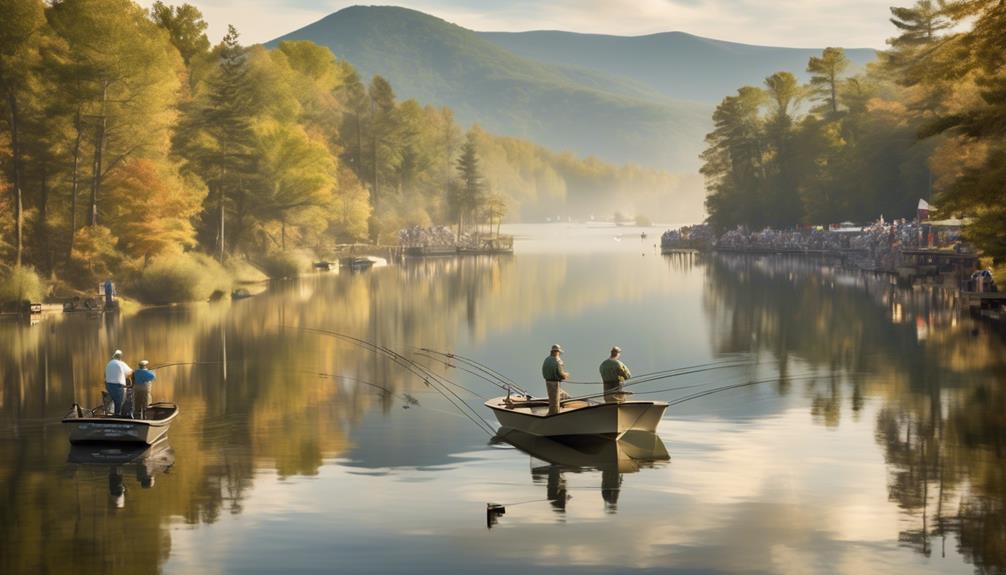So, you've decided to head to the serene waters for a day of freshwater fishing. You grab your gear and head out, ready for a peaceful day by the lake.
But have you ever stopped to wonder why obtaining a fishing license comes with a set of requirements? There's more to it than simply filling out an application and paying a fee.
There are important reasons behind the regulations imposed on freshwater fishing licenses, and understanding them can enhance your fishing experience in unexpected ways.
Importance of Freshwater Fishing Licenses
If you want to legally fish in freshwater, obtaining a valid fishing license is essential. Fishing licenses aren't just a bureaucratic requirement; they play a crucial role in environmental protection and promoting sustainable fishing practices. By obtaining a fishing license, you contribute to the conservation of aquatic ecosystems and the preservation of fish populations for future generations.
Environmental protection is a key aspect of freshwater fishing licenses. The fees collected from fishing licenses are often directed towards funding conservation and restoration projects that aim to protect the natural habitats of fish and other aquatic species. These funds also support research initiatives focused on understanding and mitigating the impact of human activities on freshwater environments. By purchasing a fishing license, you actively participate in these conservation efforts, ensuring that the natural balance of aquatic ecosystems is maintained.
Moreover, fishing licenses promote sustainable fishing practices. They often come with regulations and guidelines aimed at preventing overfishing and minimizing the impact of recreational angling on fish populations. These regulations may include catch limits, size restrictions, and specific seasons for certain species. By adhering to these rules, licensed anglers play a crucial role in preserving the delicate balance of freshwater ecosystems, allowing fish populations to thrive while also ensuring that future generations can enjoy the sport of fishing.
Legal Age and Residency Requirements
To legally engage in freshwater fishing and contribute to environmental protection and sustainable fishing practices, it's important to understand the legal age and residency requirements for obtaining a fishing license.
The legal age for obtaining a fishing license varies by state, but in most areas, individuals aged 16 and older are required to have a valid fishing license. Some states offer youth or senior licenses at a reduced cost, providing an opportunity for individuals outside the standard age range to engage in fishing activities.
Additionally, residency requirements also differ by state. Many states offer resident and non-resident fishing licenses, with resident licenses typically being more affordable. Non-residents may be required to pay higher fees for fishing licenses, but these fees often contribute to conservation efforts and the maintenance of local fisheries.
Understanding the legal age and residency requirements is essential for enjoying the benefits of a fishing license. A fishing license not only grants you the legal right to fish in freshwater bodies, but it also contributes to conservation initiatives and the protection of aquatic ecosystems.
Species-Specific Regulations
Exploring species-specific regulations can enhance your freshwater fishing experience by providing valuable insights into targeted conservation efforts and sustainable angling practices for specific fish populations. Understanding the regulations tailored to different species helps in preserving fish populations and maintaining the delicate balance of the ecosystem. Here's why these regulations are crucial:
- Fish Population Management: Species-specific regulations are designed to manage the population of different fish species. By imposing rules such as catch limits and size restrictions, authorities aim to prevent overfishing and ensure the sustainability of fish populations in specific areas. This helps maintain healthy fish populations for future generations of anglers to enjoy.
- Preservation of Biodiversity: Species-specific regulations contribute to the preservation of biodiversity within freshwater ecosystems. By focusing on the specific needs of different fish species, these regulations support the overall health and diversity of aquatic life, thereby contributing to the balance of the ecosystem.
- Protection of Vulnerable Species: Certain fish species may be more vulnerable to overexploitation or environmental changes. Species-specific regulations often include measures to protect these vulnerable species, such as implementing seasonal closures or designated no-fishing zones to safeguard their habitats and populations.
- Ecosystem Balance: These regulations play a vital role in maintaining the balance of the freshwater ecosystem. By considering the unique behaviors and habitats of different fish species, regulations help prevent disruptions to the food chain and the overall ecological balance of the water bodies.
Understanding and adhering to species-specific regulations not only ensures compliance with the law but also contributes to the long-term sustainability of freshwater fishing and the health of aquatic ecosystems.
Catch Limits and Size Restrictions
Understanding catch limits and size restrictions is essential for responsible freshwater fishing and sustainable angling practices. These regulations help to ensure that fish populations remain healthy and stable, minimizing the environmental impact of fishing activities.
Catch limits are implemented to prevent overfishing and depletion of fish stocks. By adhering to catch limits, anglers contribute to the preservation of fish populations, allowing them to reproduce and sustain their numbers. This practice is crucial for maintaining the ecological balance of freshwater ecosystems, as it helps prevent the decline of certain fish species and protects the overall biodiversity of aquatic environments.
Size restrictions also play a significant role in sustainable fishing practices. Releasing undersized fish allows them to grow and reproduce, thereby contributing to the long-term health of fish populations. Additionally, size restrictions help protect larger, breeding fish, which are essential for maintaining genetic diversity and the overall resilience of fish populations.
Conservation and Environmental Concerns
You should prioritize the conservation of freshwater ecosystems and be mindful of environmental concerns while engaging in recreational fishing activities. It's essential to understand the environmental impact of your actions and contribute to conservation efforts to ensure the sustainability of freshwater habitats and their aquatic species.
- Practice Catch and Release: Engage in catch and release practices to minimize the impact on fish populations. By releasing the fish back into the water, you contribute to the conservation of fish stocks and help maintain a balanced ecosystem.
- Use Biodegradable Gear: Opt for biodegradable fishing gear to reduce the environmental impact. Non-biodegradable equipment can harm aquatic life and contribute to water pollution.
- Support Habitat Restoration: Get involved in or support organizations that focus on habitat restoration and conservation. These efforts help maintain the natural balance of freshwater ecosystems and ensure the survival of various species.
- Educate Others: Spread awareness about the importance of conservation and environmental stewardship among fellow anglers. By sharing knowledge and promoting responsible fishing practices, you contribute to a collective effort to preserve freshwater environments.
Safety and Education Requirements
As an angler committed to preserving freshwater ecosystems, it's important to be aware of safety and education requirements to ensure responsible and sustainable fishing practices.
Safety education is crucial for both personal well-being and the protection of aquatic environments. Many states now require anglers to complete a safety education course before obtaining a fishing license. These courses cover a range of topics such as proper handling of fishing equipment, wildlife interactions, and first aid in case of emergencies. By mandating these courses, authorities aim to reduce accidents and promote responsible angling practices that minimize harm to both fish populations and their habitats.
Water conservation is another key component of safety and education requirements for freshwater fishing. Anglers are encouraged to understand the importance of maintaining water quality and conserving natural resources. This includes knowledge about catch and release techniques, understanding local fishing regulations, and being mindful of the environmental impact of angling activities. By promoting awareness of water conservation, fishing authorities seek to ensure that anglers contribute to the sustainability of aquatic ecosystems.
In addition to these educational requirements, anglers are often expected to adhere to safety guidelines while on the water. This may involve wearing appropriate safety gear, understanding navigational rules, and being mindful of weather conditions. By equipping anglers with the knowledge and skills to fish responsibly, safety and education requirements play a vital role in preserving freshwater environments for future generations.
Special Permits and Endorsements

To engage in certain specialized fishing activities, such as targeting specific species or using certain gear, anglers may need to obtain special permits or endorsements from the relevant authorities. Special permits and endorsements are put in place to ensure that fishing activities align with conservation efforts, ethical practices, and specific resource management goals. When seeking these permits, it's essential to consider the impact of your fishing practices on the environment and local wildlife.
Here are some key points to consider when obtaining special permits or endorsements:
- Fishing Ethics and Sustainability: Special permits may be required for activities such as catch-and-release fishing, which promotes ethical and sustainable fishing practices. These permits often come with guidelines on proper handling and release techniques to minimize harm to the fish.
- Species-Specific Fishing: Some areas may require special permits to target certain species, especially those that are endangered or vulnerable. This helps in managing the population of specific fish species and contributes to overall conservation efforts.
- Tagging and Monitoring Programs: Certain fishing activities, such as participating in tagging programs for research and conservation purposes, may require special permits. These programs help gather valuable data for scientific research and aid in the sustainable management of fish populations.
- Accessible Fishing Locations and Accommodations: Special permits or endorsements may also be necessary for accessing restricted fishing areas or using specific types of fishing gear. This ensures that fishing activities are regulated to protect sensitive habitats and promote sustainable use of natural resources.
Enforcement and Penalties
Special permits and endorsements play a crucial role in ensuring ethical and sustainable fishing practices, and failure to comply with the associated regulations can result in enforcement actions and penalties. It's essential to understand the enforcement measures in place to ensure compliance with fishing license requirements.
Enforcement of fishing license regulations is primarily carried out by conservation officers, who are responsible for monitoring fishing activities and ensuring that anglers possess the appropriate licenses and endorsements. These officers have the authority to conduct routine checks and inspections to verify compliance with fishing regulations.
Non-compliance with fishing license requirements can have serious consequences. Penalties for fishing without a valid license or failing to adhere to specific regulations can range from fines to potential suspension of fishing privileges. Additionally, individuals found violating fishing regulations may be required to appear in court and could face more severe legal consequences, including criminal charges in cases of significant violations.
Conservation officers are vigilant in their enforcement efforts to protect fish populations and their habitats. By imposing penalties for non-compliance, they deter illegal fishing practices and promote responsible angling.
It's crucial for all anglers to familiarize themselves with the fishing regulations applicable to their region and ensure they have the necessary permits and endorsements before engaging in freshwater fishing activities. Adhering to these regulations not only avoids potential penalties but also contributes to the conservation of freshwater ecosystems and the sustainability of fish populations.
Frequently Asked Questions
Can I Use My Freshwater Fishing License in Multiple States?
Yes, you can use your freshwater fishing license in multiple states if those states have a reciprocal agreement. Check interstate fishing license requirements and freshwater fishing license reciprocity to ensure you're following the rules.
Are There Any Restrictions on Using Live Bait in Freshwater Fishing?
When fishing in freshwater, live bait regulations vary by state. It's important to check local rules to ensure you're in compliance. These regulations are in place to protect fish populations and support conservation efforts.
Can I Transfer My Freshwater Fishing License to Someone Else?
You can't transfer your freshwater fishing license to someone else due to license regulations. Each person needs their own. It's important to follow the rules to ensure responsible and sustainable fishing practices.
How Can I Report a Violation of Freshwater Fishing Regulations?
You can report a violation of freshwater fishing regulations by contacting your local wildlife enforcement agency. Legal consequences for violations may include fines, license revocation, and even criminal charges, so it's important to report any illegal activities.
Are There Any Exemptions for Military Personnel or Veterans When It Comes to Freshwater Fishing Licenses?
If you're in the military or a veteran, exemptions may apply to freshwater fishing licensing requirements. Some states offer out-of-state reciprocity or license transferability, making it easier for military personnel and veterans to enjoy fishing.
Conclusion
So, now you know why freshwater fishing licenses have requirements. They help ensure the sustainability of fish populations, protect the environment, and promote safety on the water.
By following these regulations, you can enjoy the sport of fishing while also contributing to conservation efforts.
Remember to always check the specific requirements for your area before heading out on your next fishing trip.
Happy fishing!



